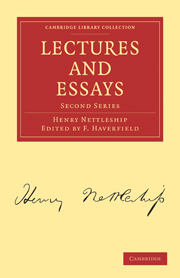Book contents
- Frontmatter
- PREFACE
- Contents
- Dedication
- MEMOIR BY MRS. NETTLESHIP
- I JOHAN NICOLAI MADVIG
- II THE ORIGINAL FORM OF THE ROMAN SATURA
- III LITERARY CRITICISM IN LATIN ANTIQUITY
- IV THE HISTORICAL DEVELOPMENT OF CLASSICAL LATIN PROSE
- V LIFE AND POEMS OF JUVENAL
- VI THE STUDY OF LATIN GRAMMAR AMONG THE ROMANS IN THE FIRST CENTURY A. D.
- VII ON THE PRESENT RELATIONS BETWEEN CLASSICAL RESEARCH AND CLASSICAL EDUCATION IN ENGLAND
- VIII THE MORAL INFLUENCE OF LITERATURE
- IX CLASSICAL EDUCATION IN THE PAST AND AT PRESENT
- X AUTHORITY IN THE SPHERE OF CONDUCT AND INTELLECT
- XI THE RELATIONS BETWEEN NATURAL SCIENCE AND LITERATURE
- BIBLIOGRAPHY
- INDEX
X - AUTHORITY IN THE SPHERE OF CONDUCT AND INTELLECT
Published online by Cambridge University Press: 05 October 2010
- Frontmatter
- PREFACE
- Contents
- Dedication
- MEMOIR BY MRS. NETTLESHIP
- I JOHAN NICOLAI MADVIG
- II THE ORIGINAL FORM OF THE ROMAN SATURA
- III LITERARY CRITICISM IN LATIN ANTIQUITY
- IV THE HISTORICAL DEVELOPMENT OF CLASSICAL LATIN PROSE
- V LIFE AND POEMS OF JUVENAL
- VI THE STUDY OF LATIN GRAMMAR AMONG THE ROMANS IN THE FIRST CENTURY A. D.
- VII ON THE PRESENT RELATIONS BETWEEN CLASSICAL RESEARCH AND CLASSICAL EDUCATION IN ENGLAND
- VIII THE MORAL INFLUENCE OF LITERATURE
- IX CLASSICAL EDUCATION IN THE PAST AND AT PRESENT
- X AUTHORITY IN THE SPHERE OF CONDUCT AND INTELLECT
- XI THE RELATIONS BETWEEN NATURAL SCIENCE AND LITERATURE
- BIBLIOGRAPHY
- INDEX
Summary
Mr. Leslie Stephen, in an article on ‘Cardinal Newman's Scepticism,’ recently published in the Nineteenth Century (1891, p. 188), says that the word ‘authority’ may mean two different things. ‘Authority, when I speak as a historian or a man of science, is a name for evidence. Authority, as used by a lawyer, is a name for coercion, whether physical or moral.’
I propose to use the word ‘authority’ in the sense of the power which, in the sphere of conduct, in the long run determines our practice, and in the sphere of intellect in the long run determines our assent; admitting, at the same time, that the two spheres are by no means always distinct in human life as we know it.
It is not necessary for me to say a word on the importance of this subject, either in itself or in reference to the present time. Every one who observes human life at all must acknowledge that the desire for authoritative guidance is one of the most universal desires which men experience and express; and that the feeling of loyalty or devotion to the persons or institutions to whom, or to which, a man owes anything of his better life is, of all feelings, one of the noblest and the most commanding. This is true at all times and in all places, but at the present time the desire is felt to be especially urgent, because it is in so many cases unsatisfied.
- Type
- Chapter
- Information
- Lectures and EssaysSecond Series, pp. 218 - 234Publisher: Cambridge University PressPrint publication year: 2010First published in: 1895

